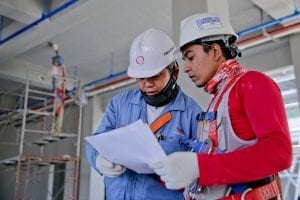
Understanding the hierarchy of a construction project can be challenging, especially when there are several key players. We get this question from our clients frequently — what’s the difference between a Program and Project manager?
According to PMI, the main difference between the two types is: Projects are temporary with the goal of producing a result or service. A program, on the other hand, is typically comprised of multiple projects, and can also contain elements that go beyond the original scope of work.
Let’s break that down a little further in terms of who handles what:
Program Manager
Program managers oversee several projects (nearly 200-300 at a time, including off-site locations) and ensure they all run smoothly, starting with the scope of work, and finishing with the owner’s satisfaction with the final result. They manage the planning process, budget, site selection and analysis, design, and construction. But it doesn’t stop there. They are also in charge of the non-physical deliverables, including owner relationship management, schedule, safety, and risk management.
Program managers are the primary decision-makers and work in tandem with the owners. They understand the needs of the owners, so much so they can speak for their needs, while also applying their best practices as leaders in the construction industry.
These folks are continuously trying to level a see-saw for each of their projects. On one end are the needs of the owner — managing expectations and handling change orders with ease. The other end of the beam holds the needs of their onsite construction team — making sure the team has the resources, equipment, and staff they need to complete the project on schedule and within budget. This is a very delicate balance that involves knowing the ins and outs of every project they are involved in.
As mentioned before, Program managers are responsible for the safety of their team(s). All sites and equipment need to be up to code, and all team members must follow strict safety precautions. Managing safety measures comes with assessing risks and mitigating damages as well. It is of the utmost importance to liaise with the owner to minimize risks for their team and provide well thought-out solutions in a timely manner.
Essentially, Program managers need to make sure everyone involved is happy. As you can probably tell, this is not a position for the average Joe.
Project Manager
The Project manager, on the other hand, handles the day-to-day onsite needs of their team. They are experts in building trades, including electrical, carpentry, plumbing, and general construction, and know everything there is to know about the project they’re in charge of. They report to the Program manager daily to let them know how the project is going, what’s needed for the team, and next steps.
As opposed to the Program manager, the Project manager typically works on fewer projects at a time. While project managers interact with the owners on a more granular level, they are also brought in to review scoping, manage expectations of the day-to-day work, schedule, and budget, while making sure their team executes.
Project managers keep Program managers up-to-date on the latest developments for their specific projects. The relationship between the Program and Project manager is key to successful delivery. Since the project manager is constantly communicating with the onsite team, it’s up to them to make sure the team has everything they need to complete the project on time.
You can think of Project managers as the leader of the construction team. They see what’s happening on the project site every day, and are therefore responsible for voicing the needs of their team to the Program manager.
If you’re looking for project managers to help out with your next construction venture, please let us know. Our team of experts is ready to help optimize the process from start to finish.




